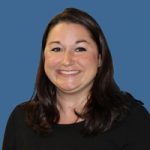Mark your calendars for the 2017 annual MLK, Jr. Celebration at Viterbo, and consider nominating someone for the annual Martin Luther King, Jr. Leadership Award. Nucleus Johnson will speak on the topic, “Echoes of a King” on Jan. 16, 2017 at 7 p.m. in Viterbo’s Fine Arts Center Main Theatre.
Nominations are currently being accepted for the Martin Luther King, Jr. Leadership Award, established in 2009 to recognize leadership and commitment in building community, enhancing diversity and working for justice. The deadline for nominations is Monday, December 12, 2016 at 11:59 PM. Request the nomination form from Ann Wales: aowales@gundersenhealth.org.
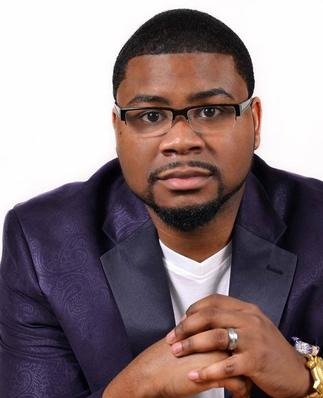
Nucleus Johnson, MLK Celebration 2017 Speaker
Nucleus Johnson has electrified crowds all over the country with his historical personification of Dr. King’s speeches since he was in the first grade. The rich legacy of MLK speaks for itself. It is a legacy that should be celebrated and honored. Professional orator Nucleus Johnson does just that. Since the age of seven, Johnson has been captivating audiences with his powerful and soul stirring renditions of Dr. King’s speeches. In 2003, Johnson received a special invitation from Coretta Scott King to participate in the MLK celebration in Atlanta. He has been blessed with an incredible ability to stand as a leader among his peers. His outspoken, yet humble personality, distinguishes him among his contemporaries. As articulated by Dr. King, Johnson believes that if we do not learn to live together peacefully as brothers, we will all perish together as fools.
Nucleus Johnson is a native of Dallas, Texas. He is married to his high school sweetheart Shayla and they have been blessed with a rambunctious son Noah.
This lecture is part of the Dr. Martin Luther King Jr. Community Celebration. Free and open to the public. No reservations required.
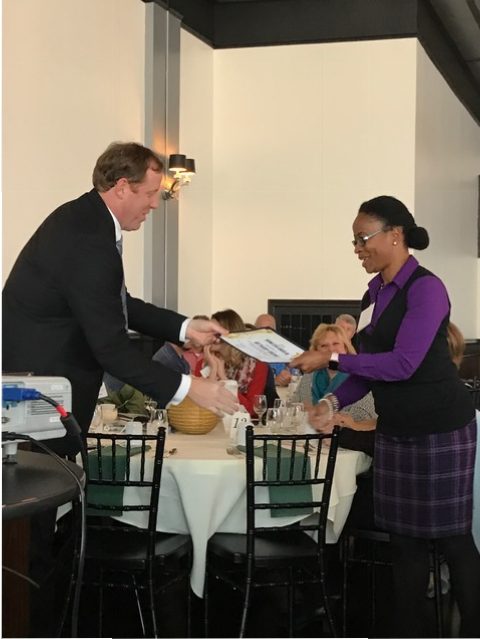
The Greater La Crosse Area Diversity Council was delighted to nominate Dr. Bethany Brent for the 7 Rivers Alliance Rising Star Award, and was very pleased to see Dr. Brent receive this award on November 17, and be honored by our community for her important work strengthening public education in the community in a variety of ways. Dr. Brent is a Senior Adviser in the School of Education at UW-La Crosse, and influences teachers in training in her work every day.
Brent has also worked with Antoiwana Williams, Director of Multicultural Student Services at UW-La Crosse, to develop a path-breaking program in the community called Grow Our Own Teacher Diversity. The program provides scholarships to community members, ages 22-50 who are seeking the opportunity to pursue four-year degrees and become certified teachers in the public schools. In La Crosse and Winona, community members of color, ages 25 and older, are more likely than their white counterparts to complete their formal education with an associate’s degree rather than a four-year college degree. The Grow Our Own program creates opportunities for community members of color to make the jump in educational credentials and the opportunities that go with that.
One of the biggest opportunities will be to have a broader impact on children, especially children of color who are much less likely than white children to see a person of their race in a position of authority in public education in our area. Brent and Williams note that “Research shows that students of color who are taught by teachers of color increased students of color learning time in the classroom, improved students of color standardized test scores, increased students of color presence in advance-level course enrollment, and increased their college going rates.” Currently though, only two percent of teachers in the school districts of La Crosse and Winona are people of color. The program is just beginning this semester, and is on track to expand and to positively influence all our students in the area public schools.
In just two years in La Crosse, Bethany Brent has begun this project while also helping organize the annual Martin Luther King, Jr. Celebration and serving on the board of the Pump House Regional Arts Center. She enriches our community in so many ways, and is truly a rising star.
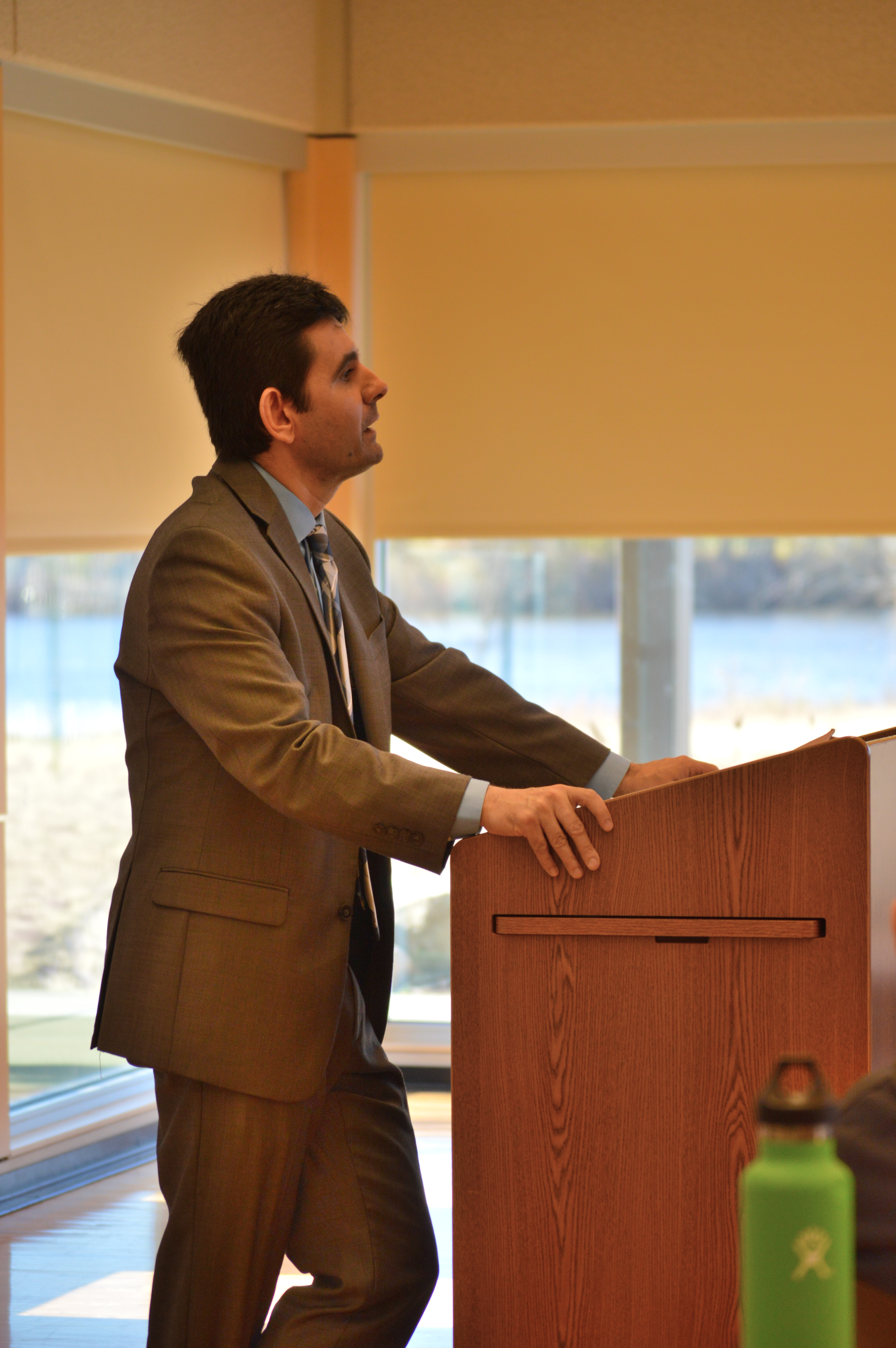 The Council’s annual conference on November 10, “Building Bridges: Workplace and Community” conference brought 55 people together, representing a wide range of area organizations. Participants learned about the work of the La Crosse Human Rights Commission to address discrimination and create a more welcoming and culturally aware community, and about promising practices for diversity and inclusion being undertaken by five large employers in the area.
The Council’s annual conference on November 10, “Building Bridges: Workplace and Community” conference brought 55 people together, representing a wide range of area organizations. Participants learned about the work of the La Crosse Human Rights Commission to address discrimination and create a more welcoming and culturally aware community, and about promising practices for diversity and inclusion being undertaken by five large employers in the area.
Points of connection between community needs and workplace initiatives included:
–The value of hiring people who can serve customers, clients, patients, in their own language
–The need for people who work in our area to feel welcome and to have their participation and voices valued both within the workplace and in the larger community
–The benefits of exposing young people in the community to different career paths; for example, health care careers are not just about being a nurse or a doctor
–The promising practice of paid internship programs that can attract diverse young people to careers in government, also adding to the creation of stronger pipelines between young people and career paths
–The need to address issues of discrimination in the community; if you have faced discrimination in housing, public accommodations, or city facilities in La Crosse, follow this link to the Human Rights Commission to find out about filing a report.
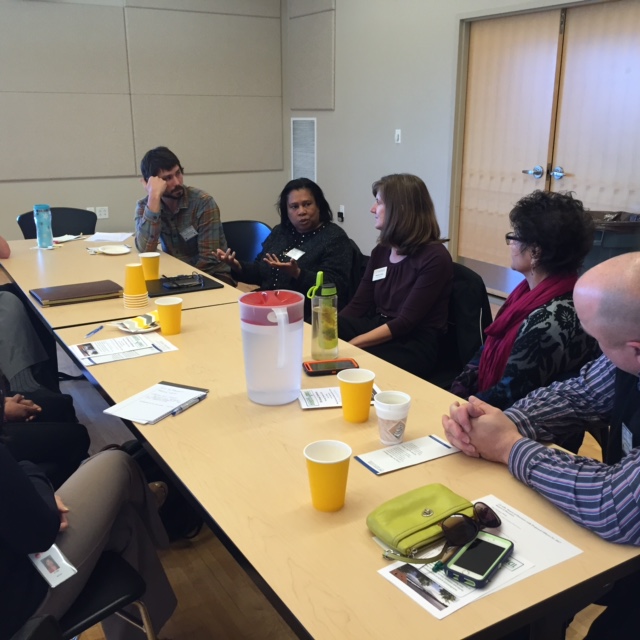
Within workplaces specifically, presenters shared important information about the following:
–The careful planning, transparency, and protections for anonymity required to undertake an employee survey to understand people’s experiences regarding inclusion, equity, and diversity, and the need to follow up on surveys with concrete actions
–The imperative to operationalize stated organizational values, such as respect, making sure people have a clear idea of what respectful behavior and speech look like in various contexts relevant to the workplace.
–The value of careful planning around multi-pronged diversity and inclusion organizational initiatives, including and planning for racial justice training
–The value of creative, proactive work to recruit for diversity.
For more information, please contact Jodi Vandenberg-Daves at jodi@glaxdiversitycouncil.com, and I can put you in touch with additional resources. Know that the learning will continue! Stay tuned for 2017 program information.
- Wednesday, September 28, 5 p.m.,
Graff Main Hall Auditorium, UW-L
Poet Denice Frohman
Denice Frohman is an award-winning poet, lyricist, and educator, whose multi-cultural upbringing inspires her to explore the intersections of race, gender, and sexuality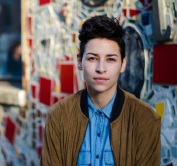
- Thursday, October 6, 5 p.m.
Centennial Hall (1309)
“We Like It Like That”: The Story of Latin Boogaloo (2015)
Introduction and discussion by
Dr. Jonathan Borja (UW-L Department of Music)

*Source: “La Crosse Area Latino/a Population and Demographics,” by Victor Macias-Gonzalez of UW-La Crosse
The Diversity Council is proud to be part of a the vibrant range of conversations and initiatives in the La Crosse area aimed at creating a more welcoming environment for immigrants, who come to the La Crosse area from around the world.
La Crosse has an active Immigration Task Force and a Centro Latino. And the La Crosse Area Latino Collaborative also engages in community outreach and programming, and houses an electronic resource guide to Latina/o serving businesses and agencies in the region. Continue reading.
At the Diversity Council’s September “Lunch and Learn,” Katie Rubin, Board of Immigration Appeals Case Manager at Catholic Charities, spoke directly to our audience of employers and civic leaders. She helped raise awareness about myths that can contribute to prejudice against immigrants, as well as native-born Latino/as, Asian-Americans, and other groups. She pointed out, for example, that undocumented immigrants pay taxes, even though they are barred from receiving many services paid for with tax dollars.
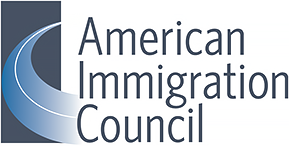
According to the American Immigration Council, immigrants and their children make up a growing percentage of Wisconsin’s population and electorate. “Latinos and Asians (both foreign-born and native-born) wield 12.5% billion in consumer purchasing power” and “the businesses they own had sales and receipts of $4.7 billion and employed more than 26,500 people at last count.”
And yet, we know that issues related to documentation, language barriers, and discrimination can make it difficult for many immigrants to access resources in the area and to have a voice and rights in their workplaces, schools, and their communities.
We invite you to contribute to these conversations and help develop solutions to make our communities more inclusive of a variety of cultures.
How can we make the La Crosse Area a great place to work and live for people of all backgrounds and identities? Join us at our annual conference as we hear about promising practices on diversity, inclusion and equity from local employers. The City of La Crosse Human Rights commission will share its purpose and its recent activities aimed at listening and learning from diverse populations in the community, and conference participants will have opportunities for sharing ideas and build connections.
Featured presenters include: Gundersen Health System, La Crosse Area Social Security Administration, La Crosse County, Mayo Clinic-Franciscan Healthcare, UW-La Crosse, the La Crosse Human Rights Commission.
Registration is $85 for non-members, $65 for members, and $25 for students. Click here to register.
If you need accommodations (e.g., communication access, alternate formats) to participate fully in this event, please contact Kathy Thoen: kathydiversitycouncil@gmail.com.

Registration is now open!
Come learn from Katie Rubin, Board of Immigration Appeals Immigration Case Manager, about the U.S. the immigration system and common myths concerning immigration. Ms. Rubin’s overview will include local immigration issues, cultural sensitivity and community collaboration, the current refugee crisis, current immigration issues and human trafficking. She will connect this social and legal situation to key issues and opportunities for employers. Diversity Council members receive a discounted registration fee.
Join the community celebration of Juneteenth, commemorating the end of slavery in the United States on June 19. The event has been organized by Cecil Adams and the African-American Mutual Assistance Network, and is the second annual Juneteenth in La Crosse. The day’s events include participation by the La Crosse Police Department and the La Crosse Historical Society. Watch for further details as the event approaches.
On June 16th, the City of La Crosse Human Rights Commission will hold a community listening session focusing on barriers and discrimination faced by Latinos in the La Crosse community. The event will be held at the Greater River Vineyard Church, 114 6th St. N., between 5:30 and 7:30 p.m. Light refreshments will be served.
This will be the third listening session held by the Commission since September, 2015. The first two focused on the African-American and LGBT community respectively. La Crosse Attorney Fabio Burgos, the Commission’s chair, says that these sessions inform the Commissions work, providing a sense from the community about what they feel are the most pressing issues that they face in terms of discrimination.
“We are still in the process of determining what the most effective use of the commission will be,” says Burgos. “The consensus is that we would like to focus on a few issues thoroughly rather than try to address everything in a piecemeal fashion. An example of one thing we have focused on is getting reports from the County Juvenile Justice Task Force on steps being taken to address the disproportionate minority juvenile arrest rate in La Crosse.”
This particular listening session also has a sense of urgency because of national politics. “Given what we are seeing on a national level, where prominent individuals and institutions are using the Latin-American population as scapegoats for economic hardships, I think this is an excellent time to hear from Latinos in our city and find out what obstacles they have encountered and hopefully get ideas of steps to address those difficulties,” says Burgos.
This listening session provides an excellent opportunity for our community to express and hear concerns related to discrimination and barriers, and to better understand the work being undertaken by the Commission. The Human Rights Commission directly addresses allegations of discrimination in housing and access to facilities in La Crosse, Burgos says, “so it is important that the community is aware that a resource exists to address these complaints. On a broader scale, the Commission’s directive is to collaborate with other community organizations to work to address discrimination in the City of La Crosse. It’s semi-unusual for a City this size to have created such a commission, so I look at that as a positive. There is much work to be done, but recognizing a need for an organization on a City level that is devoted to addressing discrimination is an important first step.”
Please attend the session if you can, and spread the word about this important opportunity for listening, learning, and addressing discrimination in our community.
We had a good turnout, and great conversation, on the topic of religious diversity in the workplace for our May Lunch and Learn. In addition to the legal issues around accommodating and avoiding discrimination on the basis of religious diversity, our speakers reminded us to consider the interpersonal dimensions of religious diversity, and the corresponding need to be thoughtful and intentional about inclusivity, and about challenging stereotypes. Ahmed El-Afandi asked the group who among us knew a Muslim, worked with a Muslim, shared a meal with a Muslim, or spent time with a Muslim person in our homes. So many hands were raised. Religious diversity is part of life in the greater La Crosse Area, and embracing this diversity enriches our social and working lives.
As with other areas of diversity, research also shows the business benefits of transparency, fairness, and inclusivity. A recent article in The Guardian cited a survey by the Tanebaum organization showing that “companies that don’t provide information about their religious discrimination policies are more likely to have staff seeking new jobs than workers at companies that do. Job satisfaction is another key issue: workers at companies that don’t offer flexible hours for religious observance are more than twice as likely to say they don’t look forward to coming to work.”
What steps should employers take to welcome and accommodate people of various organized religions as well as those individuals with what the Equal Employment Opportunity Commission refers to as “sincerely held religious, ethical, or moral beliefs?” Once again, the answer to the question of accommodation concerns workplace culture and policy, and improving both depends upon having the conversation about people’s needs. The two most common workplace complaints regarding lack of accommodations for religious people, especially religious minorities, are the lack of food options at workplace events, and the prohibition on wearing religious garments. (Prohibitions of this type are generally in violation of employment law.)
A proactive strategy taken by the law firm Ernst and Young can be instructive: the company has established “quiet rooms… which are open to all employees to take a quick break, to reflect, pray or even to take medication.” It also plans major religious and cultural holidays into its company calendar for work scheduling, and provides dietary guidance to employees planning company events.
In terms of basic compliance with the law, this helpful article from the EEOC details the meanings of religious accommodation as well as religious discrimination, harassment, retaliation, and the management of conflicts around religious expression in the workplace. For additional resources on inclusivity, check out the work of the Tanebaum organization, dedicated to combating religious prejudice. Please contact the Council if you have further questions or ideas. Let’s keep this conversation going in the La Crosse area.

